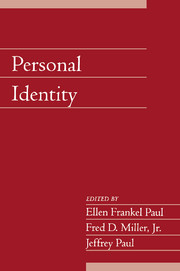
-
Select format
-
- Publisher:
- Cambridge University Press
- Publication date:
- 05 July 2014
- 04 July 2005
- ISBN:
- 9780511759345
- 9780521617673
- Dimensions:
- Weight & Pages:
- Dimensions:
- (228 x 152 mm)
- Weight & Pages:
- 0.561kg, 404 Pages
You may already have access via personal or institutional login
Book description
What is a person? What makes me the same person today that I was yesterday or will be tomorrow? Philosophers have long pondered these questions. In Plato's Symposium, Socrates observed that all of us are constantly undergoing change: we experience physical changes to our bodies, as well as changes in our 'manners, customs, opinions, desires, pleasures, pains, [and] fears'. Aristotle theorized that there must be some underlying 'substratum' that remains the same even as we undergo these changes. John Locke rejected Aristotle's view and reformulated the problem of personal identity in his own way: is a person a physical organism that persists through time, or is a person identified by the persistence of psychological states, by memory? These essays - written by prominent philosophers and legal and economic theorists - offer valuable insights into the nature of personal identity and its implications for morality and public policy.
Contents
Metrics
Altmetric attention score
Full text views
Full text views help Loading metrics...
Loading metrics...
* Views captured on Cambridge Core between #date#. This data will be updated every 24 hours.
Usage data cannot currently be displayed.
Accessibility standard: Unknown
Why this information is here
This section outlines the accessibility features of this content - including support for screen readers, full keyboard navigation and high-contrast display options. This may not be relevant for you.
Accessibility Information
Accessibility compliance for the HTML of this book is currently unknown and may be updated in the future.


